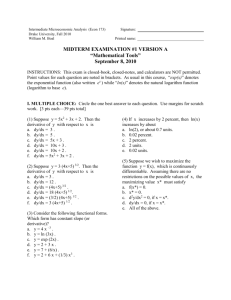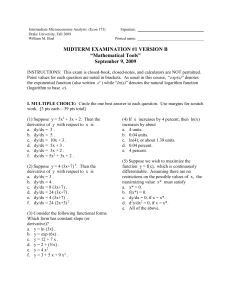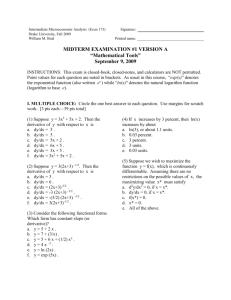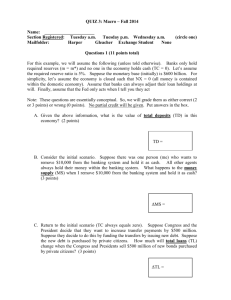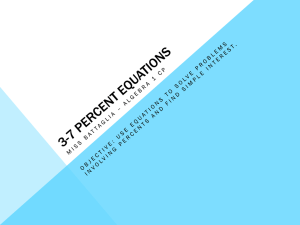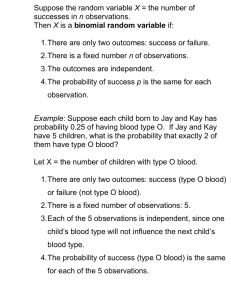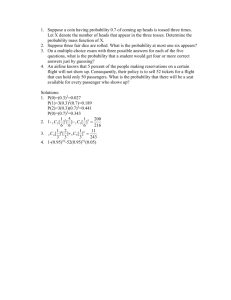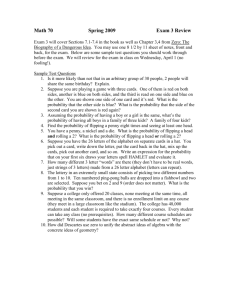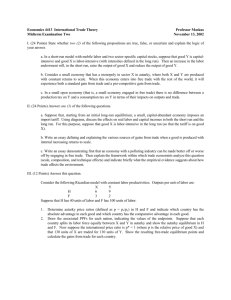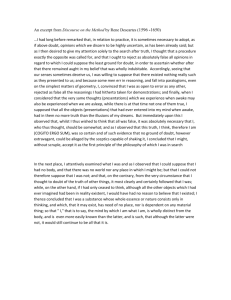version C - Drake University
advertisement
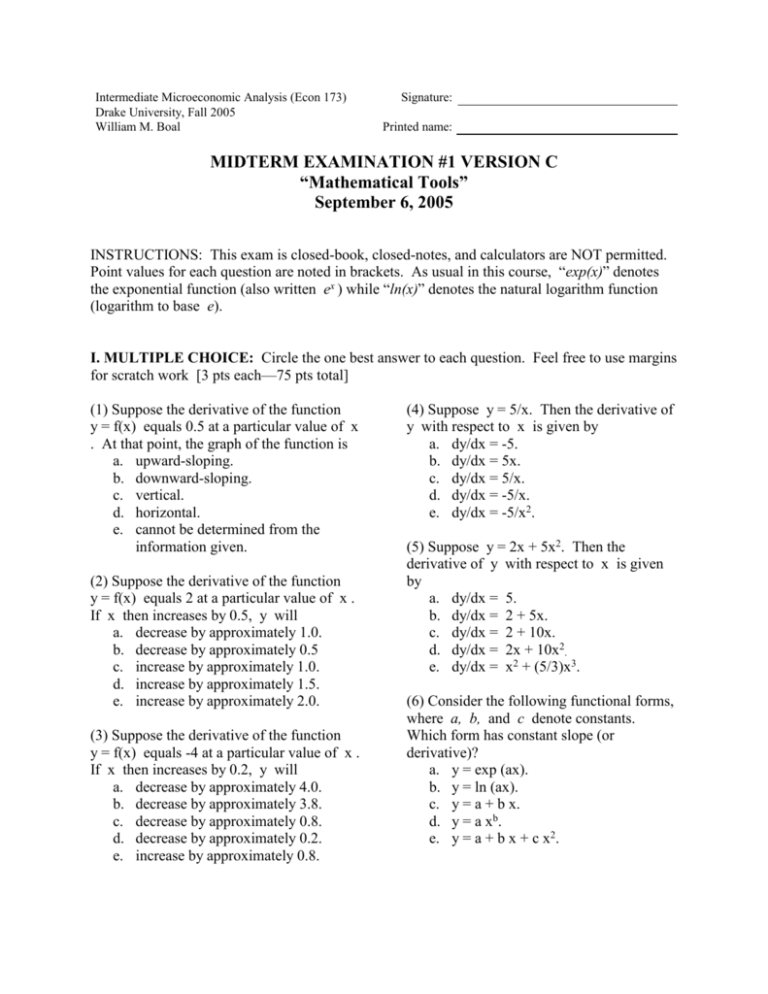
Intermediate Microeconomic Analysis (Econ 173) Drake University, Fall 2005 William M. Boal Signature: Printed name: MIDTERM EXAMINATION #1 VERSION C “Mathematical Tools” September 6, 2005 INSTRUCTIONS: This exam is closed-book, closed-notes, and calculators are NOT permitted. Point values for each question are noted in brackets. As usual in this course, “exp(x)” denotes the exponential function (also written ex ) while “ln(x)” denotes the natural logarithm function (logarithm to base e). I. MULTIPLE CHOICE: Circle the one best answer to each question. Feel free to use margins for scratch work [3 pts each—75 pts total] (1) Suppose the derivative of the function y = f(x) equals 0.5 at a particular value of x . At that point, the graph of the function is a. upward-sloping. b. downward-sloping. c. vertical. d. horizontal. e. cannot be determined from the information given. (2) Suppose the derivative of the function y = f(x) equals 2 at a particular value of x . If x then increases by 0.5, y will a. decrease by approximately 1.0. b. decrease by approximately 0.5 c. increase by approximately 1.0. d. increase by approximately 1.5. e. increase by approximately 2.0. (3) Suppose the derivative of the function y = f(x) equals -4 at a particular value of x . If x then increases by 0.2, y will a. decrease by approximately 4.0. b. decrease by approximately 3.8. c. decrease by approximately 0.8. d. decrease by approximately 0.2. e. increase by approximately 0.8. (4) Suppose y = 5/x. Then the derivative of y with respect to x is given by a. dy/dx = -5. b. dy/dx = 5x. c. dy/dx = 5/x. d. dy/dx = -5/x. e. dy/dx = -5/x2. (5) Suppose y = 2x + 5x2. Then the derivative of y with respect to x is given by a. dy/dx = 5. b. dy/dx = 2 + 5x. c. dy/dx = 2 + 10x. d. dy/dx = 2x + 10x2. e. dy/dx = x2 + (5/3)x3. (6) Consider the following functional forms, where a, b, and c denote constants. Which form has constant slope (or derivative)? a. y = exp (ax). b. y = ln (ax). c. y = a + b x. d. y = a xb. e. y = a + b x + c x2. Intermediate Microeconomic Analysis (Econ 173) Drake University, Fall 2005 (7) If x increases by 5 percent, then ln(x) increases by about a. ln(5), or about 1.6 units. b. 0.05 percent. c. 0.05 units. d. 5 percent. e. 5 units. The next question refers to the following graph of y = f(x) . y=f(x) x (8) In this graph, the derivative of y with respect to x (that is, df/dx) equals zero at a. no point on the graph. b. one point on the graph. c. two points on the graph. d. three points on the graph. e. more than three points on the graph. (9) Suppose we wish to maximize the function y = f(x), which is continuously differentiable. Assuming there are no restrictions on the possible values of x, the maximizing value x* must satisfy a. d2f/dx2 = 0, if x = x*. b. df/dx = 0, if x = x*. c. f(x*) = 0. d. x* = 0. e. All of the above. Midterm Examination #1 Version C Page 2 of 6 (10) Suppose the elasticity of the function y = f(x) equals 0.5 at a particular value of x. If x increases by 3 percent, then y will a. remain constant. b. increase by about 0.5 percent. c. increase by about 1.5 percent. d. increase by about 3 percent. e. increase by about 3.5 percent. (11) Suppose the elasticity of the function y = f(x) equals -2 at a particular value of x. If x increases by 3 percent, then y will a. decrease by about 6 percent. b. decrease by about 3 percent. c. decrease by about 2 percent. d. decrease by about 1 percent. e. increase by about 2 percent. (12) Consider the following functional forms, where a, b, and c denote constants. Which form has constant elasticity? a. y = exp (ax). b. y = ln (ax). c. y = a + b x. d. y = a xb. e. y = a + b x + c x2. The next two questions refer to the following graph of a level curve, or contour, of the function y = f(x1,x2) . x1 x2 Intermediate Microeconomic Analysis (Econ 173) Drake University, Fall 2005 (13) By definition, all points along the curve in this graph have identical values of a. y . b. the marginal rate of substitution c. x1 . d. x2 . e. all of the above. (14) According to this graph, if x2 decreases and y is to be held constant, then x1 must a. equal zero. b. increase. c. decrease. d. remain constant. e. cannot be determined from the information given. (15) Consider the function y=f(x1,x2) . Suppose at a particular point, y/x1=3, and y/x2=1. If x1 increases by 0.3 and simultaneously x2 increases by 0.2 , then y will a. remain constant. b. increase by about 0.5 . c. increase by about 1.1 . d. increase by about 4.0 . e. increase by about 4.5 . (16) Consider the function y = f(x1,x2) . Suppose at a particular point, y/x1=4, and y/x2=2. If x1 increases by 1, then y will remain constant only if x2 a. decreases by about 0.5 . b. decreases by about 1 . c. decreases by about 2 . d. decreases by about 3 . e. decreases by about 4 . Midterm Examination #1 Version C Page 3 of 6 (17) Suppose y = (x1-2)3 (x2-5)2 . Then the partial derivative of y with respect to x2 is given by the formula a. y/x2 = 2(x1-2)3 (x2-5) . b. y/x2 = (x1-2)3 (x2-5)2 . c. y/x2 = 6(x1-2)2 (x2-5). d. y/x2 = 3(x1-2)2 (x2-5)2. e. y/x2 = 2(x2-5). (18) Consider the following functional forms for y = f(x1,x2), where a, b, c, d, and e denote constants. Which form has constant partial derivatives (y/x1 and y/x2)? a. y = a (x1-b)c (x2-d)e . b. y = a + b x1-1 + c x2-1 . c. y = a + b x1 + c x2 . d. y = ax1 + bx2 + c (x1x2)1/2 . e. y = a x1b x2c . (19) Revenue equals price times quantity sold. If price increases by 6 percent and the quantity sold decreases by 3 percent, then revenue a. increases by about 1 percent. b. increases by about 2 percent. c. increases by about 3 percent. d. increases by about 5 percent. e. increases by about 6 percent. (20) Average cost (sometimes called "unit cost") equals total cost divided by the number of units produced. If total cost increases by 3 percent and the number of units produced increases by 4 percent, then average cost a. decreases by about 0.75 percent. b. decreases by about 1 percent. c. increases by about 3 percent. d. decreases by about 4 percent. e. increases by about 7 percent. Intermediate Microeconomic Analysis (Econ 173) Drake University, Fall 2005 Midterm Examination #1 Version C Page 4 of 6 (21) Consider the function y = f(x1,x2) . Suppose at a particular point, the partial elasticity of this function with respect to x1 equals 1.5, and the partial elasticity with respect to x2 equals 0.5. If x1 increases by 2 percent and simultaneously x2 increases by 1 percent , then y will a. increase by about 0.5 percent. b. increase by about 1.5 percent. c. increase by about 2.0 percent. d. increase by about 3.5 percent. e. increase by about 6.0 percent. (24) Consider the function y = f(x1,x2) . Suppose at a particular point, the marginal rate of substitution of x2 for x1 (that is, the |slope| of the level curve with x1 on the vertical axis and x2 on the horizontal axis) equals 0.5. If x1 increases by 3 units and we wish to keep y constant, then x2 must a. decrease by about 2/3 unit. b. decrease by about 1.5 units. c. decrease by about 2 units. d. decrease by about 3 units. e. decrease by about 6 units. (22) Consider the following functional forms, where a, b, c, and d denote constants. Which form has constant partial elasticities? a. y = a (x1-b)c (x2-d)e . b. y = a + b x1-1 + c x2-1 . c. y = a + b x1 + c x2 . d. y = ax1 + bx2 + c (x1x2)1/2 . e. y = a x1b x2c . The next question refers to the following graph of a level curve, or contour, of the function y = f(x1,x2) . (23) Consider the function y = f(x1,x2) . Suppose at a particular point, the y/x1=3, and y/x2=6. Then the marginal rate of substitution of x2 for x1 (that is, the |slope| of the level curve with x1 on the vertical axis and x2 on the horizontal axis) equals a. 0.5 . b. 2.0 . c. 3.0 . d. 6.0 . e. 9.0 . x1 x2 (25) Along this level curve, as we move down and to the right, the marginal rate of substitution of x2 for x1 (that is, the |slope| of the level curve with x1 on the vertical axis and x2 on the horizontal axis) is a. diminishing. b. constant and equal to zero. c. constant and equal to one. d. increasing. e. infinite. II. PROBLEMS: Please write your answers in the boxes on this question sheet. Show your work and circle your final answers. Intermediate Microeconomic Analysis (Econ 173) Drake University, Fall 2005 Midterm Examination #1 Version C Page 5 of 6 (1) [12 pts] Consider the function y = f(x) = x2 + 6x + 8 . Assume that x cannot be negative. a. Find a formula (in terms of x ) for the derivative of y with respect to x, dy/dx . b. Compute the value x* that maximizes this function, subject to the restriction that x cannot be negative. c. Compute the maximum value y* = f(x*), subject to the restriction that x cannot be negative. (2) [8 pts] Consider the following three functions. (i) y = 1/x1 1/x2 . (ii) y = [(1/x1) + (1/x2)]-1 . (iii) y = x1 + x2 . a. Which two functions have exactly the same formula, in terms of x1 and x2, for the marginal rate of substitution of x2 for x1 (that is, the |slope| of the level curve with x1 on the vertical axis and x2 on the horizontal axis)? b. What is that formula? Intermediate Microeconomic Analysis (Econ 173) Drake University, Fall 2005 Midterm Examination #1 Version C Page 6 of 6 III. CRITICAL THINKING: Answer just one of the questions below (your choice). Full credit requires good grammar, accurate spelling, and correct reasoning. [5 pts] (1) Suppose y is strictly proportional to x. What must be the elasticity of y with respect to x? Explain your reasoning. (2) Suppose the partial derivatives of y = f(x1,x2) are both positive. Do the level curves of y slope up or down? Explain your reasoning. Which question are you answering? _______. Please write your answer below. [end of exam]
